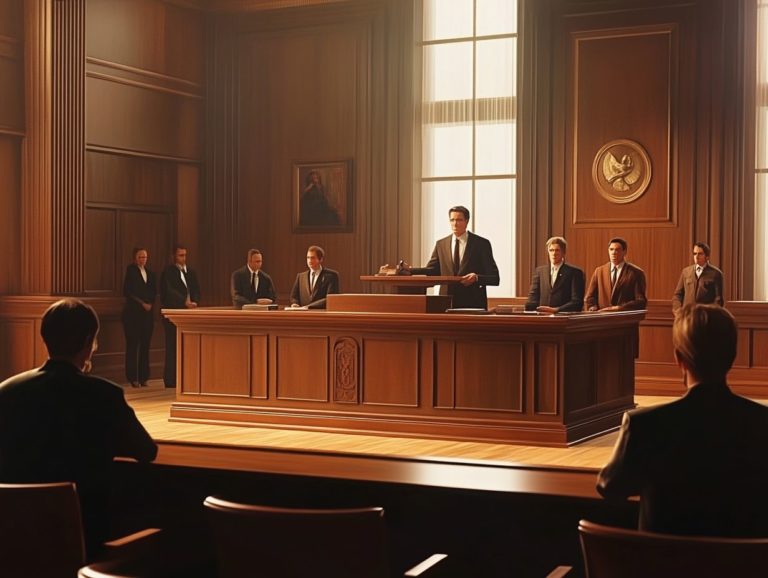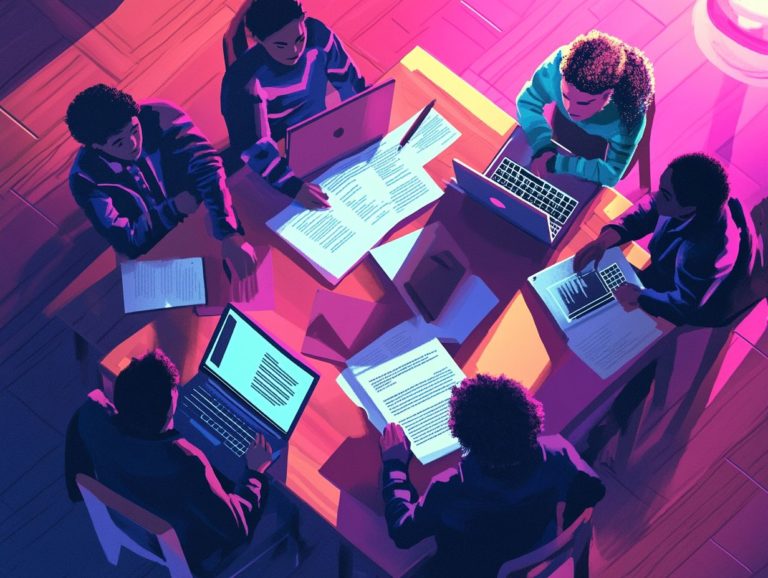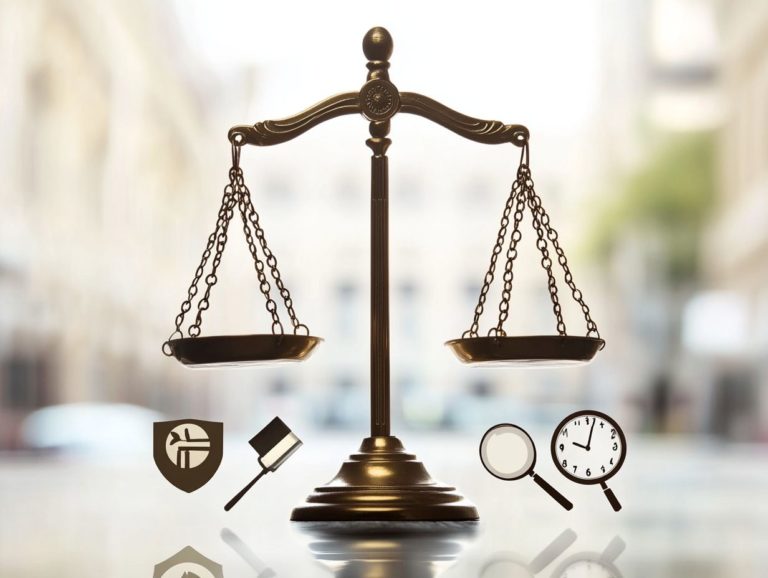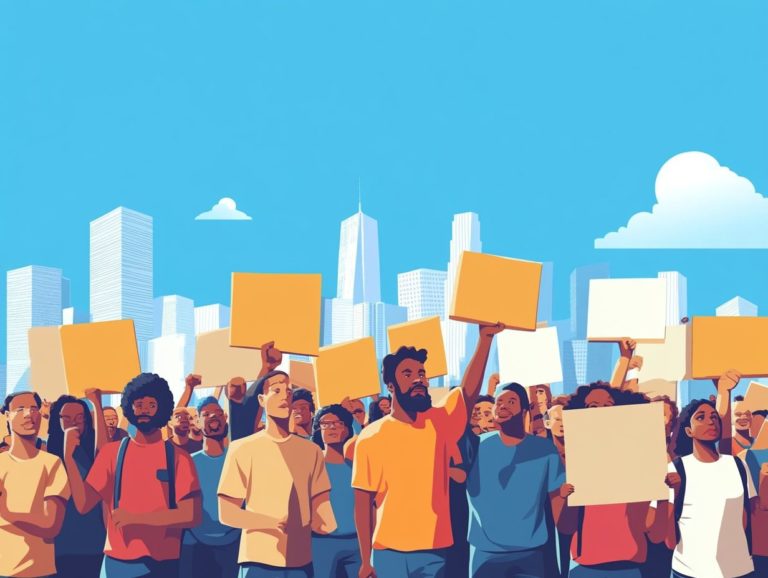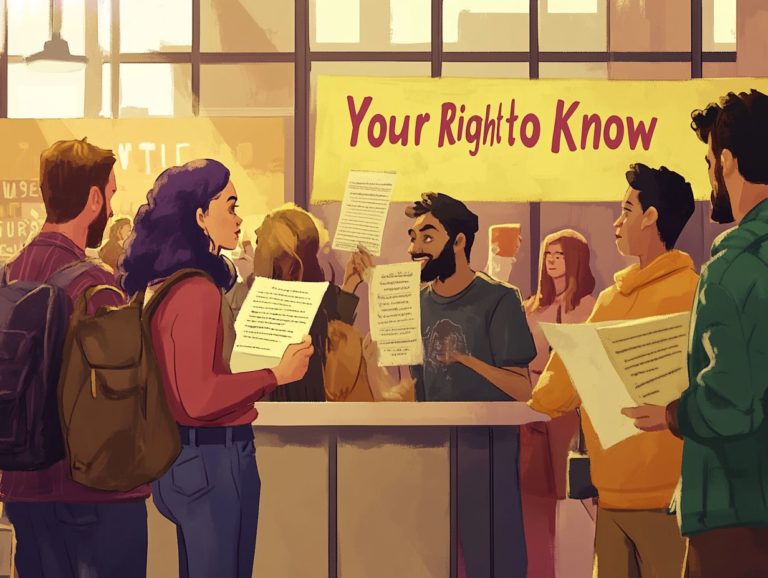What to Do If You Are Wrongly Convicted
Wrongful convictions shatter lives and devastate families.
It’s vital to understand wrongful conviction: its definition, causes, and alarming statistics. If you or someone you know is stuck in this situation, knowing how to seek legal help and file an appeal is crucial.
This article highlights resources and support for the wrongfully convicted. It also offers guidance on rebuilding your life after such a harrowing experience.
Explore this information to gain knowledge and hope now!
Contents
Key Takeaways:
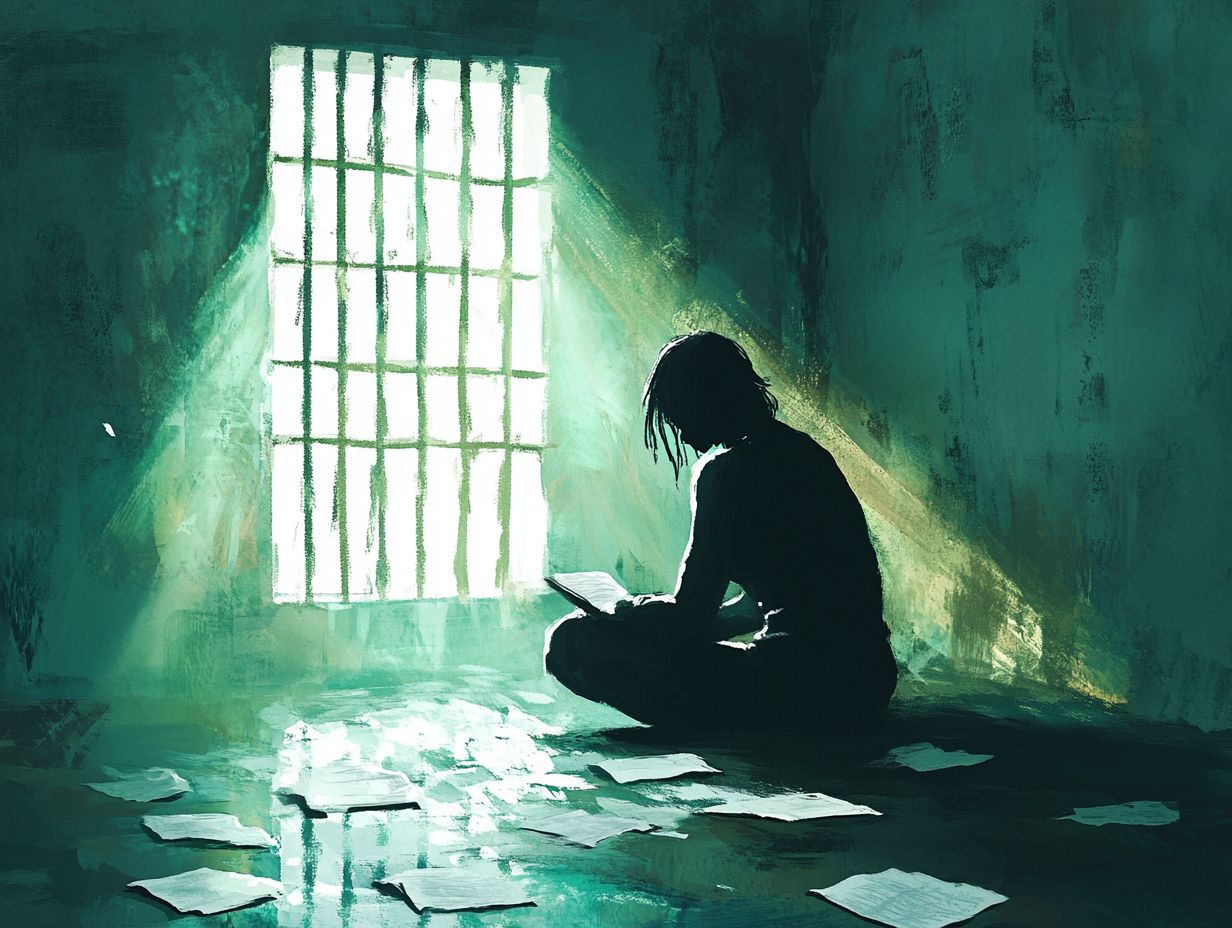
Seek legal help immediately if you suspect a wrongful conviction. Time is critical in building a strong defense.
Document your case and gather evidence, such as witness testimonies and alibis. Utilize resources available for the wrongfully convicted, including legal aid and emotional support programs.
Understanding Wrongful Conviction
Understanding wrongful conviction helps address flaws in the criminal justice system. These convictions devastate exonerated individuals and highlight systemic issues like inadequate representation.
Organizations like the Innocence Project fight against these injustices and advocate for accountability and reform.
Examining wrongful conviction statistics reveals racial disparities and emphasizes the need for careful judicial oversight.
Defining Wrongful Conviction
Wrongful conviction occurs when someone is wrongfully found guilty of a crime. This troubling reality can shake your faith in the judicial system.
Factors like unreliable witness statements, coerced confessions, and poor legal representation contribute to these errors. When key players in the justice system fail to uphold ethical standards, the chances of mistakes increase.
Wrongful convictions can take many forms, from mistaken identity to misleading forensic evidence. Each situation carries unique consequences for those involved.
Here, skilled attorneys can pinpoint flaws and advocate for the wrongfully accused, restoring faith in a faltering system.
Causes and Statistics

Flawed eyewitness testimony, police misconduct, and questionable scientific methods often cause wrongful convictions.
Statistics show a troubling trend: nearly 30% of wrongful convictions result from mistaken eyewitness accounts. For example, Ronald Cotton spent 11 years wrongfully imprisoned due to faulty identification, highlighting how easily memory can be distorted.
Conviction integrity units, special teams that review past cases for mistakes, play a critical role. Notable exonerations, like Gary Dotson’s, showcase the power of DNA evidence in correcting past injustices.
Steps to Take If You Are Wrongly Convicted
If you find yourself wrongfully convicted, act quickly to pursue justice.
Start by securing legal assistance to navigate the complex world of criminal appeals.
Seek Legal Assistance
Getting legal help is vital if you’re facing a wrongful conviction. Experienced attorneys know how to challenge the judicial system.
These professionals understand the ins and outs of appeals, evidence reviews, and procedural issues.
Resources like the Innocence Project are invaluable. They offer support, guidance, and connections to skilled lawyers.
Seek a lawyer with a strong background in appellate work and forensic evidence, who is also deeply committed to justice.
Document Your Case

Carefully keeping records is essential in fighting wrongful convictions. Detailed documentation can support your claims during appeals.
Gather important evidence like police reports and witness statements that explain your situation.
Examine any forensic evidence closely. Accurate records are crucial for challenging the original investigation.
Organized documentation empowers your legal team to build a stronger defense and increases your chances of justice.
Appeal the Conviction
Filing an appeal is a key step in addressing wrongful convictions. This allows you to challenge a guilty verdict and seek exoneration.
The process starts with a notice of appeal, usually filed within 30 days of the verdict. Then, prepare a record of the trial proceedings, including transcripts and evidence.
Appellate courts focus on legal errors, reviewing briefs from both sides. They may also consider new evidence, like expert testimony.
The appellate court can affirm the original decision, reverse the conviction, or send the case back for a new trial. Each outcome can significantly affect your fight for justice.
Support and Resources for Wrongfully Convicted Individuals
Support is crucial for those wrongfully convicted as they reintegrate into society. Organizations like the Innocence Project provide legal aid and emotional support.
Your involvement can greatly help these individuals reclaim their lives and find their place in the community.
Organizations and Programs
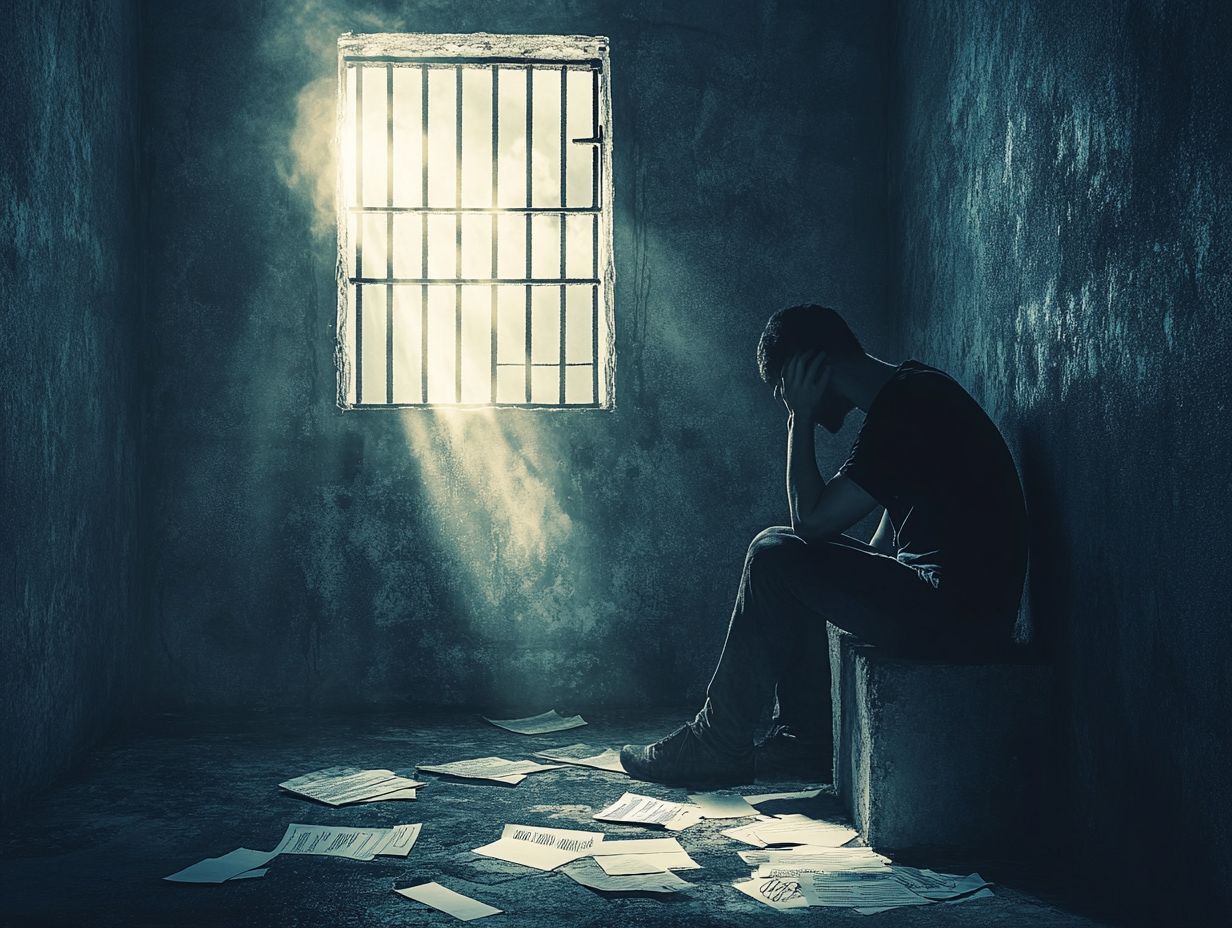
Many organizations, including the Innocence Project, help navigate the challenges after wrongful convictions.
They offer essential services like legal support, advocacy for systemic change, and help building support networks.
This approach addresses both legal challenges and emotional needs, ensuring comprehensive care after such hardships.
Community involvement is key, creating a supportive environment that helps individuals reclaim their lives while pushing for justice reforms.
Financial Assistance
Financial assistance programs are vital for individuals who have been exonerated. They often face significant obstacles while rebuilding their lives after wrongful convictions.
These programs provide crucial support for housing, education, and healthcare, facilitating smoother transitions into society. A variety of options, including grants and subsidies, are crafted to alleviate these burdens.
Organizations like The Innocence Project and the National Exoneree Network offer tailored aid, including resources to help navigate the application process for government grants and private donations.
To secure these funds, connect with these organizations for guidance on the application process. Typically, this involves presenting documentation of your exoneration and outlining your financial needs.
Rebuilding Your Life After a Wrongful Conviction
Rebuilding your life after wrongful incarceration can feel tough, but support is available. With the right resources, you can navigate your path to successful reintegration into society and pursue the justice you deserve.
Reintegration into Society
Reintegration into society can be a challenging journey for exonerated individuals. They often grapple with stigma, mental health issues, and the daunting task of finding stable employment.
Your journey toward a new life is critical. It calls for a supportive environment where community connections and understanding flourish. Engaging in counseling can provide emotional tools that help you deal with the complex feelings accompanying such profound experiences.
Job training becomes essential, offering practical skills necessary for securing stable employment. By utilizing social services, you gain access to vital resources and cultivate a sense of belonging, significantly alleviating adjustment burdens and fostering successful reintegration.
Seeking Compensation and Justice
Pursuing compensation and justice for wrongful convictions is an essential part of your recovery journey. It allows you to rebuild your life and reclaim your dignity.
If you’ve experienced wrongful incarceration, understanding the pathways to compensation is critical. Many states offer programs to aid individuals like you, providing financial support and facilitating access to vital resources for reintegration.
You can also file civil suits against the state or other responsible parties. This holds them accountable and offers you a platform to share your experiences.
The pursuit of justice goes beyond just legal issues; it holds deep emotional significance. It helps validate the suffering you’ve endured and restores a sense of agency in a life that was unjustly disrupted.
Frequently Asked Questions
Are you wrongly convicted? Here’s what you need to do!
If you believe you have been wrongly convicted of a crime, the first step is to contact a lawyer. They can guide you through the legal process and provide insight on what to do if you are falsely accused of a crime and advocate for your innocence.
Can I appeal a wrongful conviction? Yes, you can appeal your wrongful conviction. You or your lawyer can file an appeal with the appropriate court, presenting new evidence or arguing that your rights were violated.
What if I cannot afford a lawyer? If you cannot afford a lawyer, you may be eligible for a court-appointed attorney, depending on your financial situation and the severity of the crime.
What other options do I have besides appealing? If you have exhausted all appeals and are still wrongfully convicted, you may consider filing a legal request to review the lawfulness of your imprisonment.
What evidence should I gather to prove my innocence? Gather any evidence supporting your innocence, such as witness statements, surveillance footage, or other physical proof.
Can I receive compensation for a wrongful conviction? In some cases, you may be eligible for compensation, which varies by state and typically requires proving your innocence through DNA evidence or a full pardon. Consult with a lawyer for more information.
Take Action: If you or someone you know has been wrongfully convicted, learn more about your rights and seek help.


